Cow's milk for babies: at what age and how to introduce into the diet?
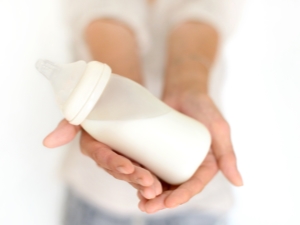
According to the laws of nature, all mammals feed their newborn babies with their own milk, and the body of each animal produces the milk that, in its composition, will be optimal for a particular organism. This means that no matter how tasty and nutritious cow's milk is, it will have a beneficial effect on the body of a young calf, but not a child. This fact was established by scientists in the XVIII century.
Is it possible to breastfeed?
Our grandmothers and great-grandmothers recalled that they often fed their babies with cow's milk. Of course, the post-war years, devastation, poverty that prevailed in the villages forced a woman to use the milk of goats and cows in cases where, for some reason, a month-old child did not have enough mother's.
But this measure is extreme, in fact, the use of a cow product by an infant can cause significant damage to a fragile body. And too much casein content often causes allergies in infants, and an excess of protein creates an increased burden on the kidneys.Cow's milk contains less iodine, zinc, vitamins E and C than is necessary for a growing body, and the amount of lactose in it is not enough (3% versus 7% in breast milk), and the child will also lack amino acids such as taurine and cystine, which necessary for the proper development of the brain (their content is 3 times lower than the norm).
In addition, the early introduction of baby cow's milk into the menu causes the risk of diabetes.

What is the use of the product?
Milk is a real pantry of calcium, which plays a major role in the formation of the musculoskeletal system. In addition, this product contains a large amount of vitamin D, without which calcium in the human body is not absorbed.
Milk provides the child with the necessary amino acids that synthesize the main building material for cells and tissues, and the carbohydrates contained in it provide energy for the whole day. Science has proven that if a child consumes too little calcium, the risk of hypertension, stroke, and fractures at an older age increases significantly.
Wherein it is not necessary to stop breastfeeding after cows' milk is included in the diet These 2 nutrient sources work very well together and complement each other. However, the use of this product is allowed only in the second year of a baby's life.

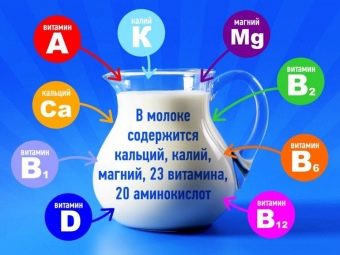
Possible harm and contraindications
If, for any reason, a young mother is unable to breastfeed her child, then special milk formulas designed for infants should be preferred. Usually they are selected by pediatricians taking into account the individual characteristics of the baby and have many advantages over plain cow's milk:
- mixtures have a constant composition, and the concentration of certain substances depends on what the cow ate;
- mixture manufacturers guarantee the presence of all important trace elements, as well as vitamins in dosages that are optimal for babies of each age;
- the structure of the mixture includes processed casein, which significantly reduces the risk of allergic reactions.
Also, the mixture can always be purchased in reserve. If desired, it can be used to make mashed potatoes and cereals, and most importantly, mothers can be completely sure that the product is absolutely safe for her baby.
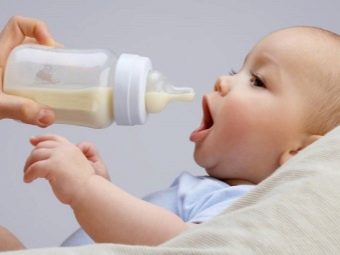
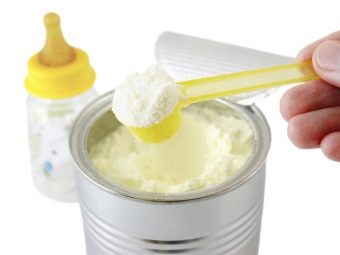
Cases when it is necessary to completely abandon the use
There are pathologies in which it is better to completely abandon the use of a product such as cow's milk. For example, if a child is prone to allergies, casein, being poorly digested, enters the bloodstream and gives a rather strong reaction of the body. You should not include milk in the diet of crumbs with lactose deficiency, because in this case the body secretes too few enzymes to process sugar.
Any metabolic disorders associated with digestion are also the basis for refusing milk, a pathology such as a violation of the absorption of galactose, which is formed as a result of the breakdown of milk sugar, is of particular danger.
Of course, it is worth refusing to consume in case of hereditary fermentopathy, which is detected by a special screening examination in the first days of life - this is also a reason to introduce a dairy-free diet from the very first days.


Why is drinking too much bad?
Milk of cows is not recommended to be consumed in large quantities by children under one year old, because the product creates an increased burden on the kidneys, which most detrimentally affects the health of the child. Moreover, as a result of such thoughtless consumption, you can get diseases that will be impossible to get rid of, and the child will be forced to support himself with medicines for the rest of his life.
In addition, if you decide to give your baby cow's milk, keep in mind that it is not known in what conditions the animal is kept, what food it is fed, and how often the udder is washed. Moreover, on large farms, antibiotics and hormones are often added to the food for cattle so that the animals grow faster - these substances cannot be destroyed even during heat treatment and pasteurization of the product. Various intestinal infections are often transmitted through milk, as well as anthrax, foot and mouth disease, tuberculosis, brucellosis, and even leukemia caused by a lymphotropic virus - and this is not at all what a small person needs.
Although in fairness, we note that if you buy milk in a store, then the risk of getting such infections is minimal, but in this case you will not get any benefit for the newborn baby.

When Do Pediatricians Recommend Starting Breastfeeding?
The question that interests many young mothers is at what exact age can you start giving cow's milk to the baby. WHO and famous pediatrician Oleg Komarovsky it is not advised to introduce it into the diet before 12 months, and there are a number of reasons for this. Up to this point, the baby's digestive tract simply cannot yet digest cow's milk in the same volume as breast milk and formula.You can not give this product to a two-month-old, three-month-old or even a seven-month-old child - it causes irritation of the digestive mucosa, and this often manifests itself in the form of blood in the baby's stool.
Before the age of one year, cow's milk is not recommended in any form - it should not be given as an independent dish and should not be added to cereals and curds - it is best to cook food using balanced mixtures.

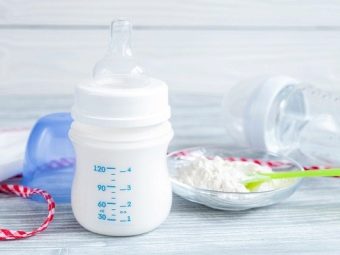
How to properly introduce into the baby's diet?
Cow's milk should be introduced into the baby's diet with great care. For the very first feeding, it must be diluted with water, but even after that, you can treat the baby with only 1 teaspoon of the resulting milk solution. It is very important to observe the reaction of the child's body after the first intake of the product. If you notice the appearance of rashes, redness, swelling, itching, or fever, then acquaintance with milk should be postponed for several months, at least 3.
If you notice that after drinking milk, the child began to cough, wheeze or breathe loudly - you must immediately give an antihistamine and call an ambulance - most often this means that an allergy caused swelling of the respiratory system, which is very dangerous for any child.
If the manifestations of allergies are very strong. then you need to contact an allergist to adjust the child's diet.

Do I need to dilute with water and in what proportion?
As we have already mentioned, in order to give milk to a baby, it must be diluted with water, for the first feeding it is better to take three times more water than milk, and observe the reaction of the crumbs. If it did not follow within 2-3 days, then you can dilute a little less, and after a week take milk and water in equal amounts.By the way, back in the 18th century, Dr. Michael Underwood, famous at that time, advised taking milk diluted in oat broth to reduce the concentration of proteins in it, or, if there is no oats, then dilute the product with water to organize the nutrition of infants.


How to choose milk?
When choosing milk for your baby, give preference to special baby products that have a composition that is much more adapted to the body of an infant. Moreover, baby milk should become the choice of caring mothers even at an older age. It is of higher quality because it is produced only from milk obtained from healthy cows kept in ecologically safe areas. At each stage of the production of baby milk, microbiological control works - the number of certain bacteria at each stage of processing is strictly normalized.
Important, that baby milk has an optimal percentage of fat content for the child's body - as a rule, in the range of 2.5-3.5%, and is also characterized by a Turner acidity index of not more than 100 degrees, which corresponds to the current sanitary standards. Milk for children is pasteurized at ultra-high temperatures - from 120 to 140 degrees for 3-4 seconds, after which it is quickly cooled. As a result of this treatment, all pathogenic microorganisms are destroyed, while beneficial ones, on the contrary, remain unchanged.
Some mothers give their babies skim milk, a common mistake, because at this stage of development, the fats found in milk are especially necessary for the child - they cause him to optimally absorb calcium and vitamin D, and also allow him to gain weight.It is possible to transfer crumbs to a low-fat product only after 3 years, and then only if the increase in the child's body weight meets existing medical standards and regulations.
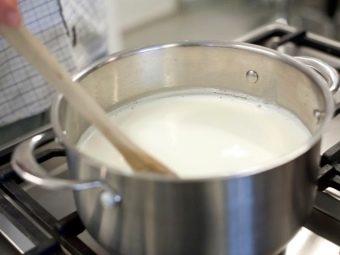

However, there are exceptions here, sometimes doctors prescribe a product with a reduced percentage of fats (up to 2%) to their patients - this happens in cases where the child is overweight or has a genetic pathology - a predisposition to obesity and a high likelihood of developing hereditary diseases heart and blood vessels.
In conclusion, I would like to recall the statements of many grandmothers that in the absence of breast milk from the mother, newborns were fed with cow's milk for centuries, even millennia. You cannot argue with this fact, but do not forget that all this took place along with a progressive deterioration in the health of children, the occurrence of complex allergic manifestations, an increased percentage of pathologies in pregnancy and childbirth, as well as a significant number of various congenital anomalies and immaturity of vital organs and systems. a child - and all this is directly related to improper feeding in the very first months of a baby's life.
If you are determined to give your child a natural product to drink, then it is better to give preference to goat's milk - it has much less proteins than cow's, and their form is better absorbed by the baby's body.
Many people love cow's milk, but few people think about at what age it can be consumed, and at what age it is better to abstain, how much it can be drunk without harm to health, is it necessary to boil it, and can pregnant women drink cow's milk? Dr. Komarovsky will answer all these questions.

















